Spring statement
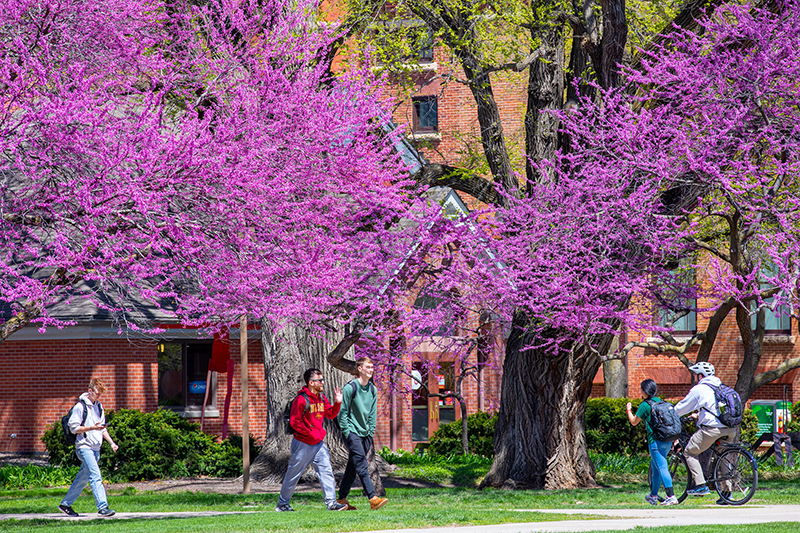
Students stride beneath a canopy of blooming redbud trees near The Hub on Monday afternoon. The colorful trees' springtime statement ushers in the end of the semester. Photo by Christopher Gannon.
Congratulations, university award recipients
More than 80 Iowa State faculty and staff are receiving one of the university's awards for 2023, including the inaugural Award for Impact on Student Success. The individuals and teams will be honored at a community celebration this fall, scheduled for Wednesday, Sept. 20 (3:30 p.m., Durham Great Hall, Memorial Union).
Following are the employees and the promotions or awards for which they've been recognized.
Distinguished Professor
The title of Distinguished Professor, first awarded in 1956, is Iowa State's highest academic honor. It recognizes a faculty member whose accomplishments in research or creative activities have had a significant impact on their discipline nationally or internationally and who has demonstrated outstanding performance in at least one other area of faculty responsibility. Nominees must hold the rank of professor and have served at least five years on the Iowa State faculty. The awardee retains the title for the remainder of their career at the university.
- Amy Bix, professor, history
- Neal Iverson, professor, geological and atmospheric sciences
- Christopher Tuggle, professor, animal science
- Kejin Wang, professor, civil, construction and environmental engineering; and Wilson Professor of Engineering
- Gregory Welk, Barbara E. Forker Professorship in Kinesiology
University Professor
The title of University Professor is awarded to a faculty member who has acted as a change agent by making significant contributions to improve the university and who has demonstrated outstanding performance in at least one other area of faculty responsibility. Nominees must hold the rank of professor and have served at least 10 years on the Iowa State faculty. The awardee retains the title for the remainder of their career at the university.
- Daniela Dimitrova, LAS Dean's professor, Greenlee School of Journalism and Communication
- Marit Nilsen-Hamilton, professor, biochemistry, biophysics and molecular biology
- Tin-Shi Tam, Charles T. and Ivadelle Cobb Cownie Professor of Music
Morrill Professor
The title of Morrill Professor is conferred on a faculty member who has exhibited excellence in undergraduate or graduate teaching or extension and outreach programs and who has demonstrated outstanding performance in at least one other area of faculty responsibility. Nominees must hold the rank of professor and have served at least five years on the Iowa State faculty. The awardee retains the title for the remainder of their career at the university.
- Jared Danielson, professor, veterinary pathology; and associate dean, College of Veterinary Medicine
- Kimberly Greder, professor, human development and family studies
- Mitchell Squire, professor, architecture
- Curtis Youngs, professor, animal science; and Ensminger Endowed Chair of International Agriculture
Regents Award for Faculty Excellence
The award is presented by the state Board of Regents to recognize tenured faculty members who are outstanding university citizens and have rendered significant service to the university or the state of Iowa.
- Matt Darr, professor, agricultural and biosystems engineering
- Carol Faber, associate professor, graphic design
- Matt Frank, professor, industrial and manufacturing systems engineering; and John B. Slater Professor in Sustainable Design and Manufacturing
- Al Jergens, professor, veterinary clinical sciences; and Donn E. and Beth M. Bacon Professorship in Small Animal Medicine and Surgery
Regents Award for Staff Excellence
The award is presented by the state Board of Regents to recognize professional and scientific or merit staff who are outstanding university citizens and have rendered significant service to the university or the state of Iowa.
- Ben Drescher, director of agriculture, animal science
- Tammy Krock, secretary, veterinary microbiology and preventive medicine
- Bill Robertson, program specialist, biomedical sciences
- Katie Woodard, lead public health veterinarian, Veterinary Diagnostic Laboratory
- Meimei Xu, research scientist, biochemistry, biophysics and molecular biology
Save the date:
University Awards Ceremony
3:30 p.m., Wednesday, Sept. 20
Durham Great Hall, MU
Award for Inclusive Excellence
The award recognizes faculty, professional and scientific staff and merit staff who have advanced the university's mission of diversity, equity and inclusion beyond their usual job responsibilities.
- Francis Owusu, professor and chair, community and regional planning
- Denise Williams-Klotz, assistant director for multicultural student affairs, Dean of Students
International Service Award
The award recognizes a faculty member for outstanding international service in teaching, research or administration within the United States or abroad.
- Nell Gabiam, associate professor, world languages and cultures
Award for Impact on Student Success
The award recognizes outstanding achievement by professional staff and faculty who have a sustained impact on undergraduate student success. This positive impact may be with individual students or a group of students, inside or outside the classroom.
- Experiential Programs Team, Pappajohn Center for Entrepreneurship: Alex Andrade, Sam Dilocker, Megan Graettinger, Ashley Sawyer and Jean Walsh
- Don Sakaguchi, Morrill Professor, genetics, development and cell biology
- Svitlana Zbarska, coordinator, undergraduate research program (campuswide)
Award for Outstanding Achievement in Teaching
The award recognizes a faculty member for outstanding teaching performance over an extended period of time.
- Frank Montabon, Dean's Professor, supply chain management
- Louis Thompson Distinguished Undergraduate Teaching designation: Jean-Pierre Taoutel, professor, world languages and cultures
Award for Early Achievement in Teaching
The award recognizes a faculty member who has demonstrated outstanding teaching performance unusually early in their career.
- Lynna Chu, assistant professor, statistics
- Bruce Kraft, professor of practice, finance
- Elizabeth McNeill, assistant professor, food science and human nutrition
James Huntington Ellis Award for Excellence in
Undergraduate Introductory Teaching
Established by a 1928 Iowa State graduate, the award recognizes a faculty member for exceptional achievement in teaching introductory courses.
- Eric Underbakke, associate professor, biochemistry, biophysics and molecular biology
Margaret Ellen White Graduate Faculty Award
Established by a longtime staff member of the Graduate College, the award recognizes superior performance by a member of the graduate faculty in enriching the student-professor relationship and enabling students to finish their work in a timely and scholarly manner.
- David Vogel, professor of psychology
Award for Departmental Leadership
The award recognizes a department chair or school director who has demonstrated exceptional leadership qualities in advancing the faculty, staff, students and programs in their department.
- Susan Cross, professor and chair, psychology
Award for Early Achievement in Departmental Leadership
The award recognizes the exceptional impact of a department chair or school director within the first three years of their leadership role.
- Michael Kimber, professor and chair, biomedical sciences
Award for Academic Advising Impact
The award recognizes outstanding performance by an academic advisor over an extended period of time.
- Jenny Baker, teaching professor, civil, construction and environmental engineering
- Deborah Holmes, assistant director of academic advising, College of Liberal Arts advising services
Award for Early Achievement in Academic Advising
The award recognizes outstanding performance by an academic advisor early in their career.
- Rhaechel Ohge Fritz, academic advisor, Ivy College of Business
- Sarah Wehner, academic advisor, College of Liberal Arts and Sciences
Award for Outstanding Achievement in Research
The award recognizes a tenured faculty member who has a national or international reputation for contributions in research and/or creative activity.
- Wenyu Huang, professor, chemistry
- Mike Wannemuehler, professor, veterinary microbiology and preventive medicine
Award for Mid-Career Achievement in Research
The award recognizes a tenured or tenure-track faculty member who has demonstrated exemplary performance or scholarship in research and/or creative activity as documented by peers or experts in the field.
- Aaron Rossini, associate professor, chemistry
- Zengyi Shao, associate professor, chemical and biological engineering
Award for Early Achievement in Research
The award recognizes a tenured or tenure-track faculty member who has demonstrated outstanding accomplishments in research and/or creative activity unusually early in their professional career.
- Thomas Iadecola, assistant professor, physics and astronomy
- Shira Zerbib, assistant professor, mathematics
Interdisciplinary Team Research Award
The award recognizes an interdisciplinary team of two or more faculty researchers with outstanding achievements who have made a significant contribution to the university's research and scholarship mission through successful interdisciplinary collaborations.
ENDURE (Electric Network Disaster Mitigation for Utilities in Rural Environment ) Team:
- Alice Alipour and Behrouz Shafei, associate professors, civil, construction and environmental engineering
- Ian Dobson, professor; electrical and computer engineering; and Arend J. and Verna V. Sandbulte Professorship in Engineering
- William Gallus, professor, geological and atmospheric sciences
- Anne Kimber, director, Electric Power Research Center
- Gary Taylor, professor, community and regional planning
- Robin McNeely, manager, and Amy Logan, research scientist, GIS Support and Research Facility
- Himar Hernandez, assistant program director, and Mary Weinand, community development specialist, community and economic development, ISU Extension and Outreach
Professional and Scientific Research Award
The award recognizes a professional and scientific staff member employed at Iowa State at least five years for excellence in research.
- Cai-Zhuang Wang, senior scientist, Ames National Laboratory
Award for Achievement in Economic Development in Iowa
The award recognizes individuals or teams of faculty or professional and scientific staff for outstanding university-based achievements in advancing the state of Iowa's economic development.
- CIRAS Manufacturing 4.0 Team: Troy Crowe, Mark Facile, Andrew Friend, Kirk Haaland, Rachel Hahn, Eric Higgins, Kira Kistner, Adam Lathrop, Gayle Mastbergen, Derek Thompson, Jeff White and Steve Wilson
- Rick Sanders, director and president, ISU Research Park
Award for Achievement in Intellectual Property
The award recognizes individuals or teams of faculty and professional and scientific staff for outstanding university-based achievements in producing intellectual property.
- Kyoungjin Yoon, professor, veterinary diagnostic and production animal medicine
Carroll Ringgenberg Award
Named for a longtime staff member in purchasing and facilities, the award recognizes an extraordinary professional and scientific staff member who exhibits constant and contagious dedication to and goodwill for Iowa State.
- Chris Strawhacker, campus planner, facilities planning and management
Professional and Scientific Excellence Award
The award recognizes contributions made by a professional and scientific staff member within and beyond the university and career progress demonstrated by accomplishments at Iowa State.
- Kate Goudy, programs manager, human development and family studies
- Jeff Mitchell, meat processing specialist, animal science
- Patrick Wall, beef specialist, ISU Extension and Outreach
Professional and Scientific Outstanding New Professional Award
The award recognizes a professional and scientific staff member who has demonstrated outstanding accomplishments unusually early in their professional career.
- Karen Barker, grant specialist, College of Veterinary Medicine
- Jim Jordahl, project analyst, natural resource ecology and management
- Claire Kruesel, undergraduate program coordinator, biochemistry, biophysics and molecular biology
R.K. Bliss Extension Award
Named for the director of Extension from 1912 to 1946, the award recognizes outstanding achievement of an extension staff member for developing an overall or continuing extension education program.
- Rich Wrage, regional director (Boone, Carroll, Greene and Guthrie counties), ISU Extension and Outreach
Award for Distinguished Service in Extension and Outreach
The highest award bestowed on an extension professional recognizes sustained distinguished performance and educational contributions to Iowa State's clientele through extension programs.
- Russ Euken, livestock specialist, region 3, ISU Extension and Outreach
Award for Outstanding Achievement in Extension
or Professional Practice
The award recognizes a faculty or staff member who has demonstrated outstanding performance in statewide leadership in extension or professional practice, and has achieved national recognition for outreach activities.
- Garland Dahlke, research scientist, agriculture, ISU Extension and Outreach
- Eric Burrough, professor, veterinary diagnostic and production animal medicine
Award for Early Achievement in Extension
or Professional Practice
The award recognizes a faculty or staff member who has demonstrated outstanding accomplishments in extension or professional practice unusually early in their career.
- Beth Reynolds, state specialist, Iowa Beef Center, ISU Extension and Outreach
Collision of chaos and innovation propels student learning
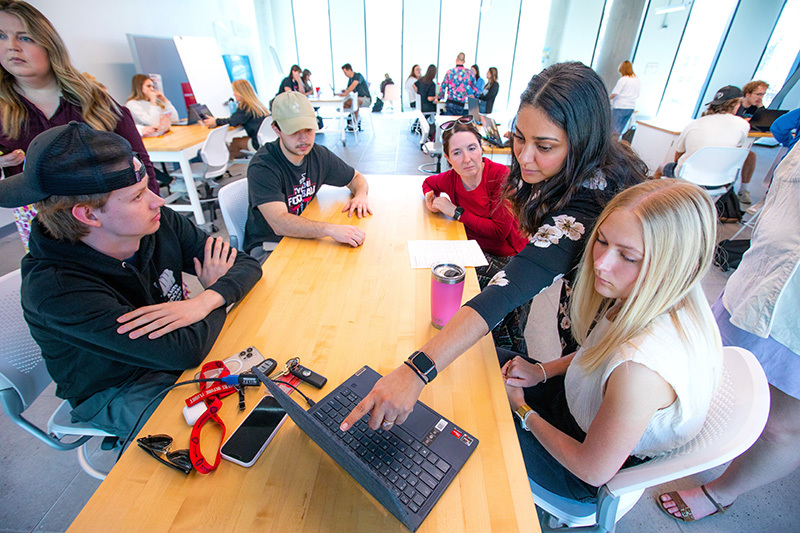
Architecture associate professor of practice Leila Ammar (second from right) reviews a product design with Ana Luz (behind Ammar), interim director of innovation programming at the Student Innovation Center. Students (counterclockwise from bottom right) Chloe Mettenbrink, Nicholas Kroening and Jacob Tassin listen in during creative recess last week at the Student Innovation Center. Photos by Christopher Gannon.
Innovation or organized chaos?
It's the question four faculty members pondered on Thursdays this spring. A week before classes began, they devised a plan to teach their courses by putting the full purpose of the Student Innovation Center to work, creating an interdisciplinary learning session led by students.
Teaching team and their classes
Ana Luz, interim director of innovation programming, Student Innovation Center; and associate teaching professor, industrial design, DES 150 Introduction to Innovation and Design
KP Williams, assistant teaching professor, leadership studies, LD ST 370 Leadership, Entrepreneurship and Innovation
Leila Ammar, associate professor of practice, architecture, DES 340 Design Entrepreneurship
Alex Dill, assistant teaching professor, industrial design, IND D 330 Creative Thinking
Lexi Young, graduate assistant, horticulture
Rebecca Nation, learning and development specialist, Student Innovation Center
Eva Newland, peer mentor, journalism and mass communication
Lucy Hawblitzel, peer mentor, graphic design
"We were going to bring different perspectives from across campus to have this opportunity for experiential learning that is student-centric to the max," said leadership studies assistant teaching professor KP Williams.
Each instructor teaches their course, linked to innovation or entrepreneurship, on Tuesdays, but Thursdays brings the four classes -- ranging from 50 to more than 100 students -- together in the innovation center for more than an hour of "creative recess," an innovation ideas' incubator.
"The Student Innovation Center staff conducted several focus groups with students from across campus with different majors, and they returned a consistent message of 'wanting a safe place to think,'" said Ana Luz, interim director of innovation programming at the Student Innovation Center. "That led to us dedicating half our classes to creative play, where they can come together and bounce ideas off each other."
The instructors are in the room to be guides and mentors, but students with different majors and backgrounds work individually or in groups on topics that interest them. That included participating in the college-by-college pitch off competition earlier in the semester and continued with projects for last month's Innovation Fund Challenge.
Williams is the primary instructor for the large group sessions, horticulture graduate assistant Lexi Young serves as an assistant across all four courses and Eva Newland and Lucy Hawblitzel are undergraduates in journalism and graphic design, respectively, who act as peer mentors. They bring different perspectives that spark ideas and discussion.
Recess
The semester began with more structured Thursdays to provide students with basic concepts of innovation, Williams said. The focus also was on students identifying a project they could develop over several months.
"We did not put any limits on them and were very intentional about ensuring there was cross-collaboration between the classes and colleges," he said.
Groups of students formed around ideas to build pitch proposals, often with peers from other majors who brought new ways of looking at the idea. Creative recess -- which brings together students from five colleges and includes more than 10 majors -- is open not only to the students taking one of the four courses, but any ISU student available during that time.
"In the groups, designers are immediately thinking about logos and sketching out product ideas, and the business students think about it practically and how to make it profitable," said Leila Ammar, architecture associate professor of practice. "It really represents the real world because you bring in people that have the expertise to add to your team."
Forty-two undergraduates -- 11 teams and eight individual projects -- worked from February through April on ideas and pitches before presented at the Innovation Fund Challenge to win some of the $20,000 available. Those who didn't reach that mark still can earn scholarship money by presenting during finals week.
"Students awarded funds for the Innovation Fund Challenge continue the project next year," Luz said. "The bookend of this story is that most of these students will be mentored in the next year by those people judging them, and as happened in the past, some of them end up getting jobs with companies the judges come from. We created an innovation readiness pathway for our students."
Impact
This semester has been a learning experience for instructors and students, but Williams can imagine the potential impact.
"Five years, two jobs or two careers from now, I hope these students are saying, 'This made my experience because it was so different from every other course,'" Williams said.
Luz believes the team created a model other faculty could use -- scaling up or down as needed -- to enhance learning by bringing classes together. The faculty involved in "creative recess" already have committed to do it again next spring.
"Co-teaching is hard," she said, "but if faculty are all committed and engaged, so much can be gained."
Student reaction
Williams said most of the students -- covering all levels of undergraduates -- embraced the new teaching format, even if he detected skepticism early on.
"For students, it has been both intriguing and very challenging because it's not what any student has experienced," he said. "We pivot from week to week as opportunities happen."
Three of the instructors required students to develop a pitch off competition idea, so about 100 worked on those during Thursday's recess activities. The results included college winners and placers at the finale. Students whose interests didn't include pitch development could submit alternate assignments to complete the course, Williams said.
Instructors spent Tuesdays focusing on content specific to their courses and how it could be applied to large group discussions. Students also were asked to reflect and apply what they were gaining from the large sessions into their class. The faculty met weekly on Wednesday to plan and address any issues.
Ammar was the only professor who had to rework her class schedule to match the 11 a.m. meeting time, but only after polling students about their desire to take part in weekly large-group interactions.
"To start, 10 of my students were design majors and one was a business major, but she has since changed to industrial design," Ammar said. "She took the class to see how it was different to think of entrepreneurship in a design, not business, way -- and changed majors."
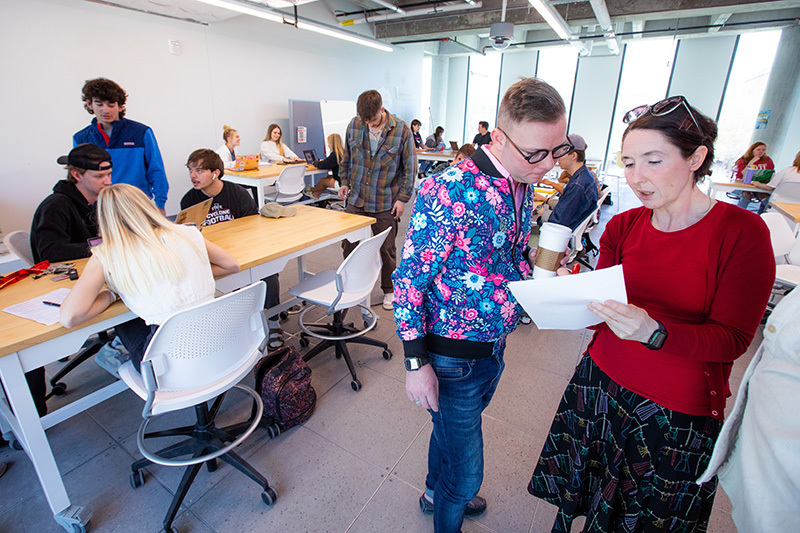
Interim director of innovation programming at the Student Innovation Center Ana Luz (right) talks with leadership studies assistant teaching professor KP Williams during a session of creative recess last week at the Student Innovation Center.
Digital textbooks become the default this fall; print remains an option
Beginning with preparations for fall semester, the ISU Book Store has adopted a "digital first" model for textbook sales to save students money and provide a centralized, convenient access to their course materials.
"When faculty submit their course materials to us, we are going to assume digital when there's an appropriate digital match," said bookstore assistant director Heather Dean. She said faculty keep the option to choose print instead of digital, though the difference is now they need to request print.
The digital default does not apply to items like workbooks, course packets and lab manuals, which the bookstore will continue to sell.
Immediate access' track record
In the bookstore's immediate access program (IA), students access their digital course materials in Canvas on the first day of the semester. The digital-first shift was endorsed by student government, the provost's office and the Center for Excellence in Learning and Teaching (CELT), which administers the Canvas learning management system.
The change also aligns with a student-centric aspiration in the new strategic plan.
"This is about serving our students first and maximizing affordability for them," Dean said.
She said 81% of course materials on campus already are offered in their digital version through the IA program. Another 5% of course materials have been digital though technically not in the IA program; for example, software licenses or instances where a student opts for digital even when the faculty member designated the print version.
Noting that some textbooks in certain disciplines don't yet have a digital version or the cost savings for some is negligible -- classic paperback novels for a literature course, for example -- Dean estimated the current ceiling for digital course materials at Iowa State at about 90%. So there's still a little room to save students money.
Students like it
While the digital trend is national, it comes down to a campus' culture, and digital has been "highly adopted, accepted and embraced" at Iowa State, Dean said. ISU students can opt out of a digital text and request its print version, but that's happened in just 2% of recent digital course selections by faculty.
Immediate access eliminates textbook lines at the bookstore, shipping delays from the publisher (or expedited shipping charges) or the occasional delay due to late or additional instructor appointments.
And then there's the cost savings. Dean said the bookstore saved ISU students more than $2 million this academic year off of digital (not print) retail prices -- or about 25% savings. Many publishers aren't printing books anymore, so the savings no longer is computed against print textbooks, she explained.
Different skill set for textbook team
Dean said the bookstore's textbook team has become a technology team, negotiating prices with the publishers and working with CELT staff to deploy digital course materials in Canvas. But the process still starts with faculty adopting their course materials for an upcoming term. Questions about the digital first model may be directed to John Wierson, 294-3501, digital and immediate access specialist at the bookstore.
Provost reviews faculty advancement with senators
Senior vice president and provost Jonathan Wickert gave his annual review of faculty advancement data at the Faculty Senate meeting on May 2. The state Board of Regents approved promotion recommendations last month.
Seventy-five faculty members were approved for promotions including tenure. The group included 43 cases of promotion to associate professor with tenure, tenure-only awards for three associate professors and 29 promotions to full professor for tenured faculty. Five cases were denied.
Of the 89 tenure-eligible faculty hired in fiscal year 2017, 38 received tenure this spring, nearly 43%. Another 21 faculty took advantage of tenure clock extension options, including adverse impacts of the COVID-19 pandemic. Another 26% left the university, a departure rate similar to past averages.
Created in March 2020, the COVID-19 tenure clock extension was available through April 1, with 122 extension requests approved to date.
Thirty-seven term faculty successfully advanced with no unsuccessful cases. More than 70% of these promotions were in the teaching track.
"The work really happens in the departments and colleges through the faculty committees and for those who served on them this year thank you for your hard work," Wickert said. "Successful promotion and tenure cases really depend on successful mentoring happening throughout the faculty members' careers."
In other discussion, Wickert said the full list of courses available to satisfy the revised U.S. diversity requirement is posted online along with approved transfer courses.
New leader
Past-president Andrea Wheeler (architecture), who represented an ill president Jon Perkins (accounting), passed the gavel to 2023-24 senate president Sarah Bennett-George (apparel, events and hospitality management). Rahul Parsa (finance) assumed the role of president-elect.
Other business
Senators approved the 2023 spring graduation list. More than 4,700 students are expected to earn degrees this semester.
The senate will vote in September on:
- A change to scholastic recognition for undergraduates by discontinuing the Top 2 Percent and creating a President's List honor. The list will recognize students with at least 24 credit hours or satisfactory-fail courses and a 4.0 GPA for their two most recent semesters at the university (excluding summer sessions). Pass-not pass classes do not count toward the 24-credit hour requirement.
- Adding a standard course wait-list policy to the university catalog beginning in 2024-25 to coincide with the implementation of Workday Student. Students are added to the wait list on a first-come, first-served basis. If a seat becomes open, the first student on the list will be notified and has 24 hours to take action. Students can join a waitlist and accept or decline a seat through the fifth business day of the fall and spring semesters. Senators raised questions about students who need a course to graduate, and the possibility of large wait-list courses that could take days or weeks to finalize.
Innovation bookshelf offers a place to start
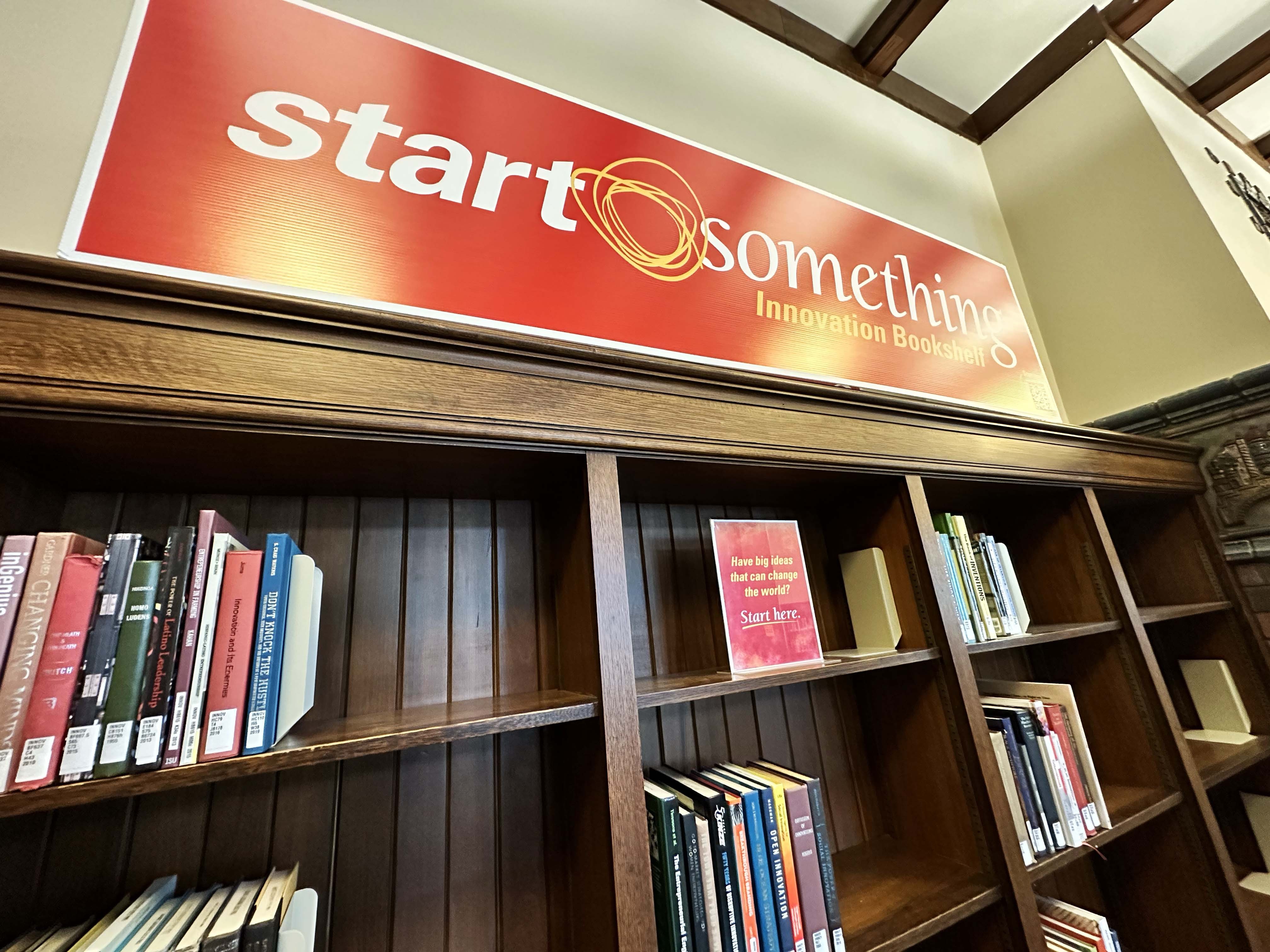
Physical titles on the Innovation Bookshelf can be found in the fireplace reading room of the Parks Library. E-books in the collection are on the library's website. Photos by Carly Hanson.
Finding resources to turn creative ideas into projects and start-ups just got a little easier with the launch of the Innovation Bookshelf at Parks Library.
With more than 200 titles so far, business and economics librarian Jeffrey Kushkowski said this permanent collection of print and e-books has something for everyone.
On campus and online
In addition to the physical titles located in the fireplace reading room, you can find the print and e-books in the collection on the library's website. E-books can be accessed by signing into your library account.
Kushkowski said the library has more than 13,000 books on entrepreneurship and innovation, evenly split between print and e-books. The Innovation Bookshelf is a curated collection of high-impact books applicable to any field of study and accessible for employees and students at any point in their innovation journey.
Most of the books on the shelf were chosen from those owned by the university, though Kushkowski also is keeping a list of suggested books to consider purchasing for the collection.
"We're looking at creativity, design thinking, personal growth, communication and books that are relevant for any discipline," Kushkowski said.
Creating the collection
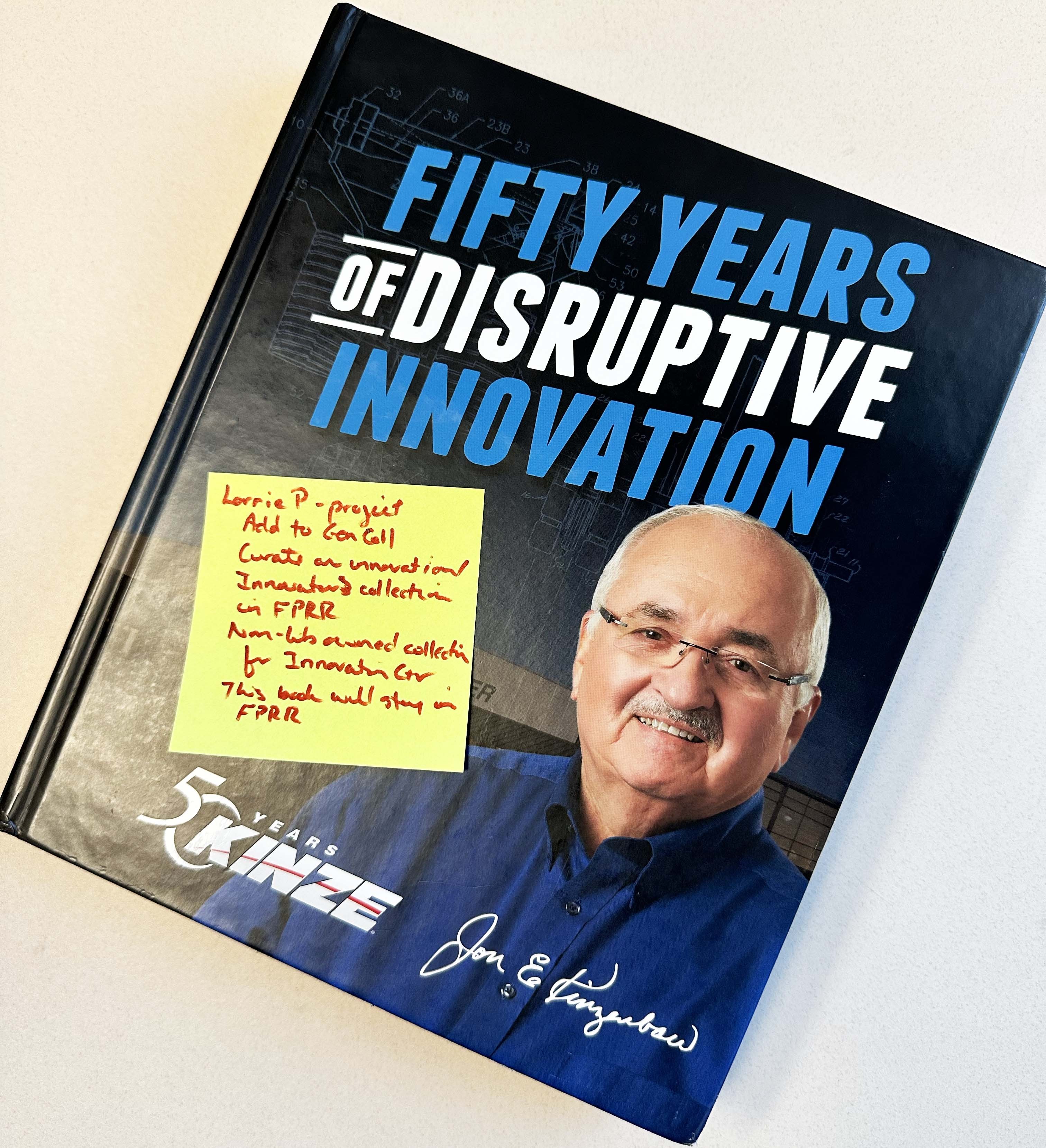
The book that started it all. A sticky note on a book detailing the history of Kinze Manufacturing, an Iowa-based farm manufacturing company, led to the creation of the Innovation Bookshelf.
"Curate a motivational innovation collection in the fireplace reading room," read the sticky note on the cover of "Fifty Years of Disruptive Innovation" by Kinze Manufacturing, the book donated by the senior vice president and provost on behalf of the president's office that started the Innovation Bookshelf.
To grow the collection, Kushkowski asked colleagues for titles of books related to innovation and reached out to Start Something leaders for photos of their bookshelves. From there, he began the process of selecting the books.
"We have book exhibits that happen periodically throughout the year for different events, but this bookshelf would be the first permanent collection of its kind," said Kushkowski. "The collection is geared towards the campus community and it's here for people to use."
If you have suggestions for books to add to the collection, contact Kushkowski at kushkows@iastate.edu or 515-294-2408.
Art Mart delivers one-of-a-kind gifts
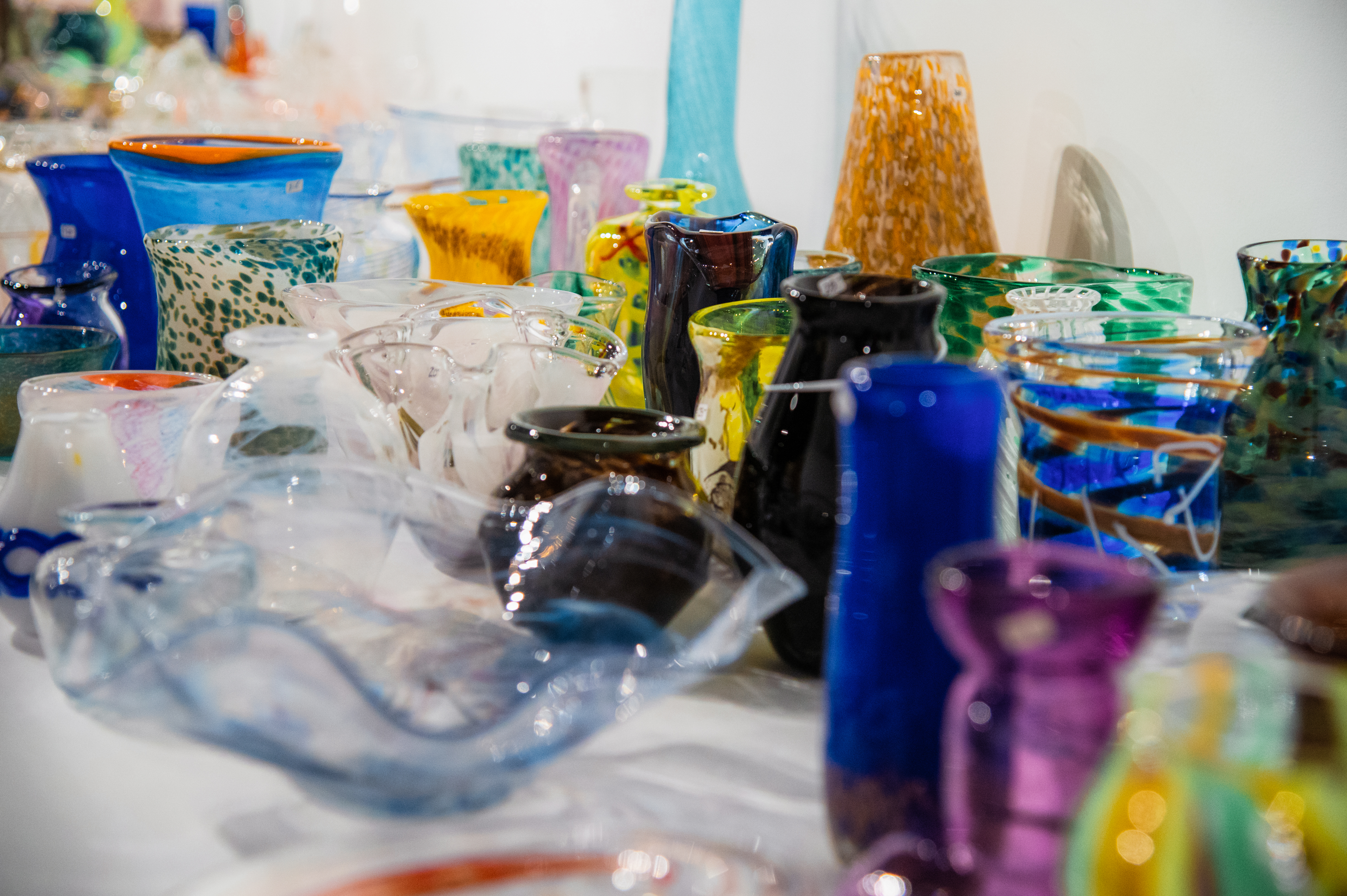
Colorful and unique vases, bowls and decorations created by the ISU Gaffer's Guild, the artistic glass blowing club, are available for purchase at Art Mart. Photos provided by Letitia Kenemer.
Art Mart, the biannual art sale sponsored by the Memorial Union Workspace and ISU Gaffer's Guild, will be May 9-12 in the Memorial Union Art Gallery.
The boutique-style marketplace features pottery, blown glass, prints, jewelry and more, all made by Workspace and ISU Gaffer's Guild students and instructors. Supporting local artists and providing an opportunity for students to showcase their work makes this event special for arts and Workspace coordinator Letitia Kenemer.
"It encourages people to buy local and support artists in their area," Kenemer said. "We all want to support artists, but I think sometimes we forget to look where we are. There are lots of talented people right here."
Spring 2023 Art Mart
Memorial Union Art Gallery
- May 9: 4-7 p.m.
- May 10: 10 a.m.-7 p.m.
- May 11-12: 10 a.m.-4 p.m.
Fun and funds
Proceeds from Art Mart support the Workspace and ISU Gaffer's Guild as well as the students and instructors who sell their work. Kenemer said the event often is the first time students have sold their art and it gives them an idea of what it's like to price their pieces, do inventory and prepare a table.
"Selling their work at Art Mart provides experience. Every time they do it, it gets better and they become more comfortable and get ideas for next time," Kenemer said. "When artists come in and they're excited about selling their work -- those moments feed my soul. That's why I do what I do."
Kenemer also likes to connect student artists with Workspace alumni who come back to sell or volunteer at the event.
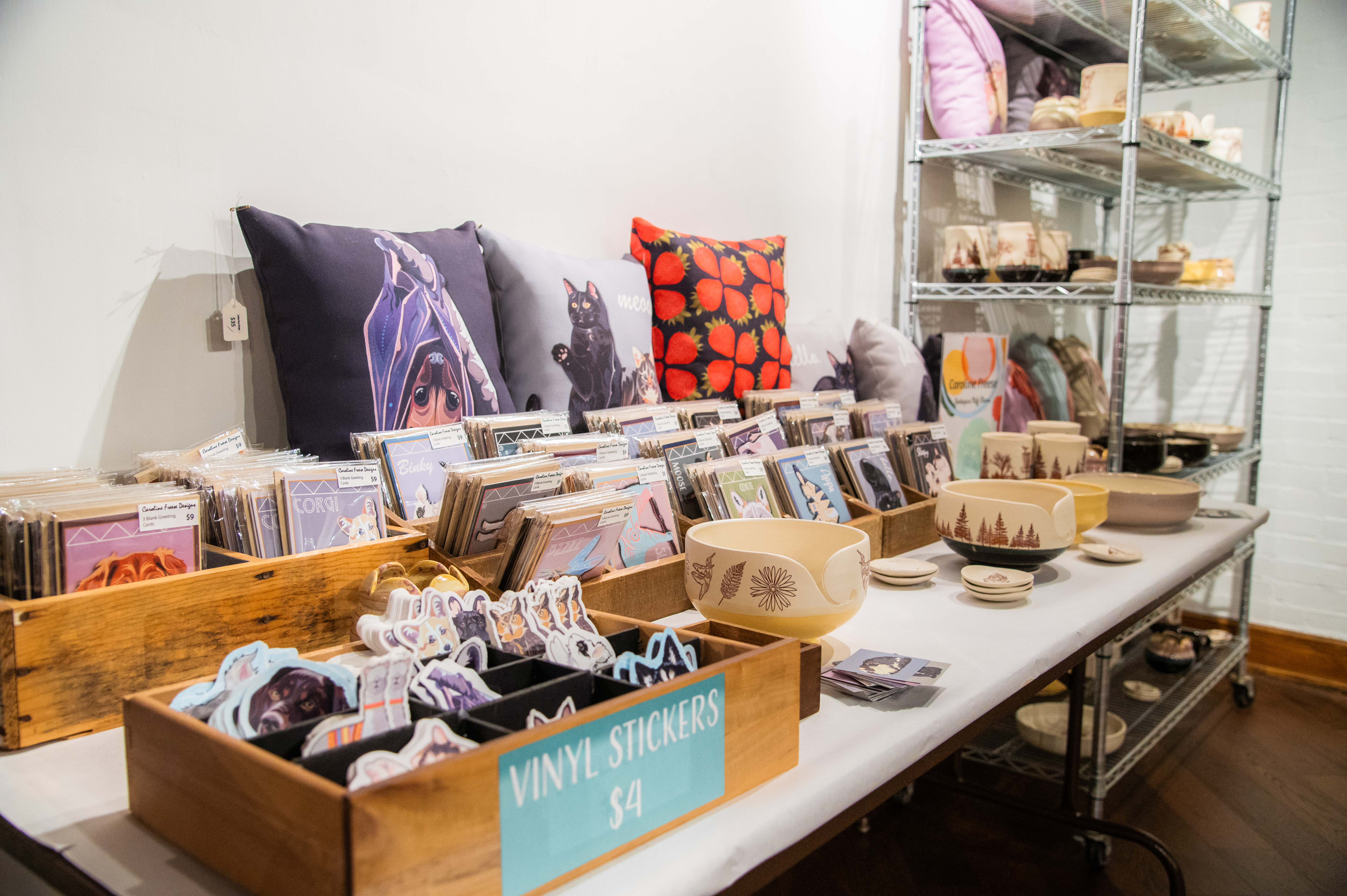
You can find stickers, prints and pottery and more made by students and instructors in the Workspace at the biannual Art Mart.
"I try to set them up with my current Workspace staff so they can get to know each other, talk about what they did after college and make those connections in the local art community," she said.
Art Mart start
According to Kenemer, the first Art Mart happened in 2000, two years before she took over as Workspace coordinator. Since its founding, the event has grown to include work by instructors and additional vendors.
At first, Kenemer said the sale was a way to stop unclaimed items -- primarily pottery -- from piling up and raise money for the Workspace. After taking the helm in 2002, Kenemer said she has tried to do something new each year to make the event unique. The partnership with the ISU Gaffer's Guild arose from these efforts.
"The Gaffer's Guild used to sell at a table or booth in the MU -- I remember buying from them -- and one time I said, 'Hey, would you ever want to just do this with me?'" Kenemer recalled. "I'm always trying to think of another way we can fill a niche without taking away from existing artists."
More than two decades after the first Art Mart, Kenemer is still thrilled to see a line out the door and meet people who are excited about art created by the campus community.
"I love seeing people that come to Art Mart year after year and making that connection," she said.
